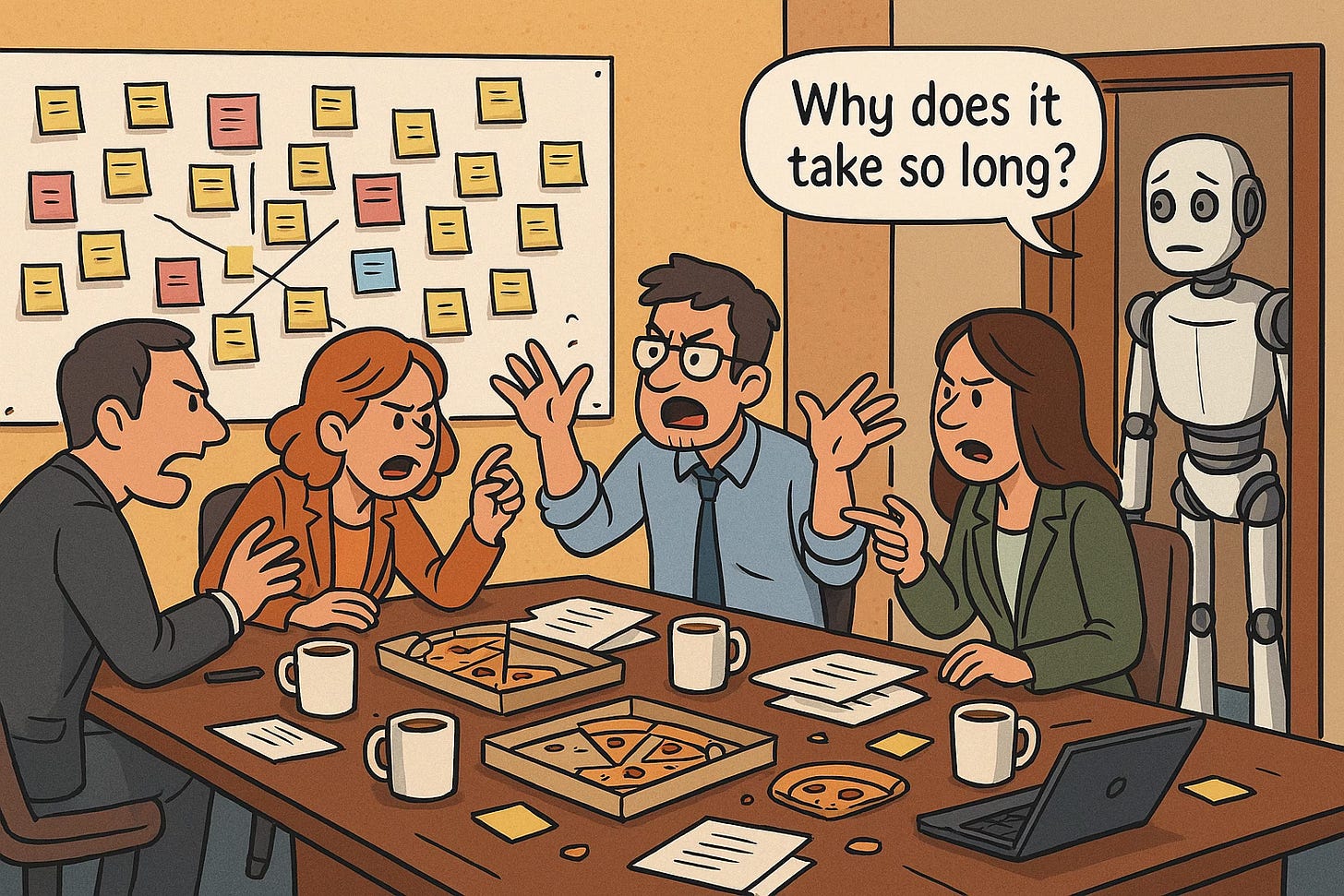Beyond Frameworks: How AI Redefines Product Development
The prescriptive frameworks we have been following blindly for years are about to hit a wall. Not because agility itself is flawed, but because the commercialized, commodified version we call "Agile" (with a capital A) has lost its way.
And AI will put the last nail in its coffin. I’ll tell you why…
I have seen this unfold for a while now. The signs are everywhere if you're paying attention. Scrum Master roles are disappearing. Those once-praised Agile coaches are barely seen anymore. The whole Agile Industrial Complex - with its certifications, frameworks, tools and rituals - is collapsing under its own weight.
I'm not an AI enthusiast. I'm more of a skeptic. Or better said, an informed pragmatic.
But what happens when a product team can build a fully working MVP in a week instead of a quarter? That's not incremental improvement. That's a strike.
For years, business folks complained that IT was too slow. Engineers were underperforming, underdelivering. How "keep IT accountable" sounds to you? Familiar?
Funny how things change. The tables are turning.
Code is outrunning decision.
Imagine the future (not too far, let's say like one or two years from now) of an AI-augmented team next to you, getting tasks done while you are in the steering committee debating priorities and evaluating effort. Generating prototypes faster than CX can ingest them.
How does it sound? Code outrunning decision, I'd say.
We have been treating software development like factory work for too long, breaking everything into an assembly-line way of work. Optimizing for resource utilization. Managing to output rather than outcome.
And now we get exactly what we wished for - an assembly line that operates on fast-forward. Picture this…
But when your production line moves 10x faster, can your supply chain keep up? Can the white collars keep pace with the people on the factory floor?
Who will be blamed when the bottleneck shifts from engineering to leadership?
The way forward isn't adapting frameworks to accommodate AI. Those frameworks weren't brought in by engineers or product managers anyway. SAFe and the whole circus came from somewhere else.
In the next few years, teams will either be let alone to execute at speed, or organizations won't have any chance to survive. Because there will be many other companies which will execute at that speed. Survival will be a matter of letting people do their job, outside of the whole noise of Jira, ceremonies, and prescriptive frameworks.
AIgility, that's the word I'd say. A fundamental shift.
When execution becomes cheap and fast, code is no longer the bottleneck - decision-making is.
If execution tickets flow instantly, who even has time to manage them? Do they even exist in the future? And the POs and PMs? They'll finally escape the backlog treadmill they've been stuck in for far too long.
We might need entirely new metrics. Forget velocity and story points (those cryptic numbers nobody used as intended anyway). Maybe we'll start measuring something like "Thinking Before Build Time" - how well a team transforms insight into clarity before engaging the AI Machine.
Or perhaps we'll face a new form of debt. Not just technical debt, but "Prompt Debt" - poorly framed prompt patterns that compound over time, leading to poor AI execution. Or maybe "AI Cognitive Debt" - the slow atrophy of critical thinking and core competencies as people over-rely on assistants.
But if you ask me, the most fascinating shift is the fusion of product and technical crafts.
"Who will build tomorrow’s software? And how?" you might ask…
When "programming" approaches natural language with minimal syntax guardrails, the barrier between "technical" and "non-technical" dissolves.
The future's average developer will be a blend of product and technical skills - like today's developer who is clever enough to understand the business side and the problem they are set to tackle.
I'm not an AI evangelist painting some utopian future. I'm just looking at what is already happening and following it to its logical conclusion. And no, I’m not one of those saying the developer role will disappear.
It won’t, but it will transform - btw, how many developers would we need today if we were to use the same 001001001 machine code to write all the software we have now?
Agility, critical thinking, and adaptive thinking won’t die, they’ll become a rare and praised currency. But Agile™, with its scaled frameworks, gamified certifications, and weird rituals, is already a walking dead. What comes next won’t be built in Jira. It will be shaped by teams who can think fast, decide faster, and execute at machine speed.
AIgility? Maybe. But one thing’s certain: in this new landscape, only the adaptive will survive.
This is just the surface of a complex transformation. I'm exploring these concepts and more in my upcoming book on how AI is fundamentally reshaping product development. If you want to join this journey and get updates as I develop these ideas further, connect with me on LinkedIn or subscribe to this newsletter.

